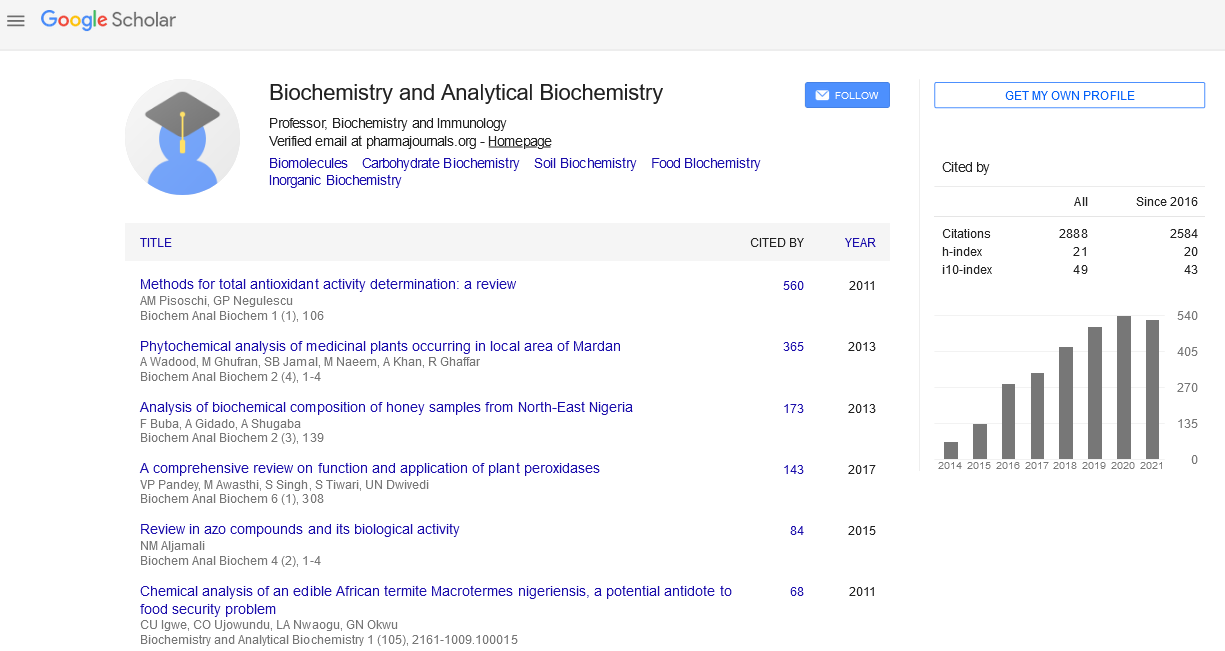Indexed In
- Open J Gate
- Genamics JournalSeek
- ResearchBible
- RefSeek
- Directory of Research Journal Indexing (DRJI)
- Hamdard University
- EBSCO A-Z
- OCLC- WorldCat
- Scholarsteer
- Publons
- MIAR
- Euro Pub
- Google Scholar
Useful Links
Share This Page
Journal Flyer

Open Access Journals
- Agri and Aquaculture
- Biochemistry
- Bioinformatics & Systems Biology
- Business & Management
- Chemistry
- Clinical Sciences
- Engineering
- Food & Nutrition
- General Science
- Genetics & Molecular Biology
- Immunology & Microbiology
- Medical Sciences
- Neuroscience & Psychology
- Nursing & Health Care
- Pharmaceutical Sciences
Regulation of MYC by protein kinase A and polo-like kinase 1: New therapeutic avenues for cancer
International Conference and Exhibition on Biochemical & Molecular Engineering
October 07-08, 2013 Hilton San Antonio Airport, TX, USA
Achuth Padmanabhan
Accepted Abstracts: Biochem Anal Biochem
Abstract:
The level of MYC oncoprotein in cells is tightly regulated through transcriptional, translational and post-translational mechanisms. Deregulation of MYC regulation is associated with many cancers. We identified the existence of a novel MYC- Protein Kinase A (PKA)-Polo-like Kinase 1 (PLK1) signaling loop in cancer cells. Sequential MYC phosphorylation by PKA and PLK1 protects MYC from proteasome-mediated degradation. Interestingly, short-term pan-PKA inhibition diminishes MYC level, while prolonged PKA catalytic subunit α (PKACα) knockdown, but not PKA catalytic subunit β (PKACβ) knockdown, increased MYC. The short-term effect of pan-PKA inhibition on MYC was identified to be post-translational and the PKACα- specific long-term effect on MYC transcriptional. These data also reveal distinct functional roles among PKA catalytic isoforms in MYC regulation. We attribute this effect to differential phosphorylation selectivity among PKA catalytic subunits, which we demonstrate for multiple substrates. Further, we also show that MYC up-regulates PKACβ transcriptionally forming a proximate positive feedback loop. These results establish PKA as a regulator of MYC and reveal the distinct biological roles of the different PKA catalytic subunits. In addition, these results also highlights both the promise and potential pitfalls of global kinase inhibition, and emphasizes the need to develop next generation therapeutic strategies capable of disrupting specific kinase- substrate interactions.
Biography :
Achuth Padmanabhan has completed his Ph.D. from University of Maryland Baltimore County working under Dr. Charles J. Bieberich. His doctoral work led to the discovery of novel signaling pathways regulating the stability of key oncogenes and tumor suppressors in prostate cancer cells. He is currently pursuing postdoctoral studies at Yale University. His current work aims at understanding assembly of yeast and mammalian proteasomes. His research has been published in reputed journals and he serves as an editorial board member of many scientific journals.


